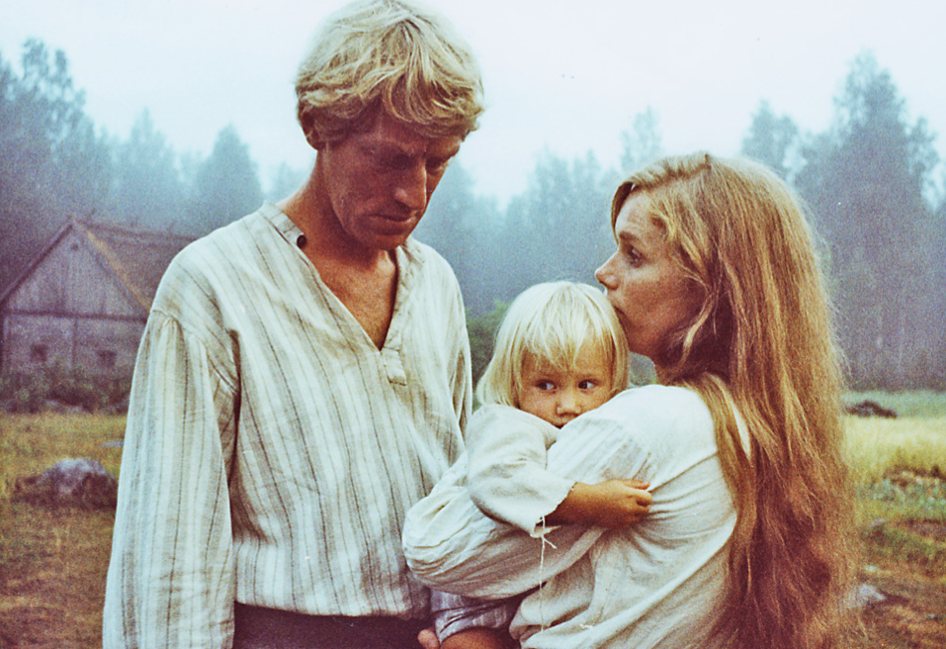Editor's Note: We will now resume our intermittent investigation into 1972 films for the impending smackdown -- though it will not be this weekend due to unfortunate delays. Here's Eric Blume on the Oscar favored foreign epic The Emigrants, available to rent on Amazon or iTunes.

It’s fun (and by fun, I mean zero actual fun) to watch Jan Troell’s 3 hour and 20 minute epic film The Emigrants and try to figure out how this slow-burn, where nothing good happens to any of the characters for the entire running time, made it into the Oscar race, not in one year but in two! Due to different rules than we have currently, The Emigrants was nominated for Best Foreign Language Film in 1971, and then for the 1972 Oscars was nominated for a whopping four of the big eight categories: Best Picture, Best Director, Best Actress (Liv Ullman), and Best Adapted Screenplay.
The Emigrants mostly follows a peasant family in rural Sweden in the mid-19th century. Despite back-breaking work, the father (Max von Sydow) and mother (Liv Ullman), realize that they cannot survive on their farm. A series of horrible events befall them before they decide to leave for a 10-week boat journey to America in hope of a better life. Another family, who leave for the promise of religious freedom, joins them for the grueling ordeal...

The farm portion occupies about 90 minutes of screen time, then the boat journey takes up the next hour, and then the final 45 minutes track their final voyage to Minnesota. This film serves up lice, scurvy, vomit, infant death, and an assortment of other elements that usually do not scream “Oscar”. The characters don’t have movie-convenient arcs, and to say the pacing is “leisurely” would be incredibly kind. So how did it end up on the Best Picture list alongside The Godfather, Cabaret, Deliverance, and Sounder?
Troell’s film remains a singular achievement. His approach feels almost like a documentary: the camera follows these characters as if it’s simply catching moments here and there in their daily life. You don’t feel like scenes are set up for you in the way you’re accustomed to seeing. Troell is shaping the film dramatically nonetheless: the seemingly-nothing moments contribute forcefully to a coherent whole. You’re enveloped in the texture of these peoples’ lives. Troell never makes you doubt the authenticity of this world. He creates an almost new kind of storytelling which still feels revolutionary.

As a result, the actors aren’t really the focus of this film, because they don’t have showy moments to play. It’s fair to say that von Sydow and Ullman are two of the greatest actors who have ever lived, and they’re featured here in all their glorious blondness: these are two powerful camera faces, and their natural ability to hold a screen helps Troell enormously. That said, it’s a surprise that Ullman made it onto the Best Actress list that year, as she doesn’t have a large range of emotions to play here, and her character doesn’t have incredible complexity either (purposefully so). The best performance in the film comes from Eddie Axberg, who plays von Sydow’s brother with an intoxicating blend of intellectualism and sensuality.
The Emigrants is the first half of this family’s story, which continues in another three-hour epic called The New Land, following the family’s story once they've arrived in Minnesota. The New Land was nominated for Best Foreign Film in 1972, the same year that The Emigrants was up for its big four awards! But of the ten foreign films that have received Best Picture nominations, The Emigrants is the longest and slowest-moving, and the one least designed for mainstream audience satisfaction (although Cries and Whispers and Amour give it a run for the money).

Have you seen Troell’s majestic epic? Did you admire its unrelenting toughness? What epic foreign film is your favorite?